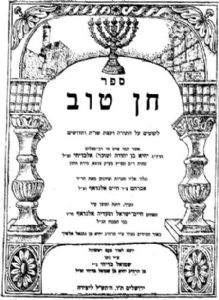A Short Tribute
Hacham Yihya Badikhi, son of Yehuda Socher, as born in 1803 in Sana'a, Yemen. Mori Yihya Badikhi was raised among the sages of Sana'a and studied with them. He became proficient in both the revealed and concealed aspects of Torah, and his profession was that of a Torah scribe.
In 1834, the Jews of Sana'a were suffering from the effects of various decrees. Mori Yihya Badikhi was imprisoned and tortured in prison. After a short period, he succeeded in escaping and left for the city of Kawkaban, where he led the local Jewish community. Following the Turkish conquest of Sana'a in 1873, Mori Yihya Badikhi returned to Sana'a to head its yeshiva, where many of his students, including Mori Shalom Alsheich, were to become outstanding Torah scholars.
Mori Yihya Badikhi passed away on 16 Tishrei, 1887. He authored two books: Lechem Toda – a summary of halakhic rulings concerning ritual slaughtering, based on Mori Yihya Tzalakh's book, Sha'arei Kedusha, and Chen Tov – sermons on the Torah and Responsa.
A few quotes from the Rabbi on 'Torah Study' in which he teaches to use stories to draw people to study Torah
"Why did He begin with Genesis?" Sage Yehuda seeks to teach us and to engage the Torah scholar coming to teach and preach to the people so that they learn from the Divine One's attributes. The Torah should have begun with "This month is", for this is the first of the commandments that the People of Israel, upon receiving the Torah, were commanded and it is nearly the beginning of the Torah… But in order to draw the hearts of people to begin studying Torah, He did not begin the Torah thus, with the commandment of the month, but opened with the story of His mighty works, in a way similar to the Torah scholar who, coming to preach to the people, must begin with a story of the past. This is what is meant by "Why did He begin with Genesis?" As if to say: He could have told of the wondrous acts and miracles He performed for us and for our forefathers after the commandments.
The explanation lies in that "He told His people of the power of His acts". Meaning that those who are to preach the LORD's commandments and teachings to the people are to learn from His attributes and actions. Just as He begins the Torah and opens with stories of the past, of the world's creation, which draw people into the study of Torah, and stir the human heart to love the LORD when it sees the wondrous acts, mercies and miracles done by the Almighty for our forefathers and their children, such as taking them out of Egypt – what I call stories – as the verse says, "and He has declared to His People".
Chen Tov, pp. 2-3, Dror Printing, Jerusalem 1970
